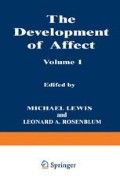Abstract
Freud’s first theory of neurosis was an affect theory. It developed into an instinct theory that, in the minds of many, superseded it. Jacobson, who pointed this out in a paper in 1954, believes that this occurrence greatly delayed efforts to clarify the concept of affects and their relationships to other aspects of development. Much that Freud formulated originally in terms of emotions has been shifted and rephrased into instinct theory, but pieces of affect theory have persisted as isolated fragments. Benjamin wrote in 1961, “we do not have [in psychoanalysis] an adequate theory of affects in general and of anxiety in particular, in spite of the significant contributions of Rapaport and others.”
Access this chapter
Tax calculation will be finalised at checkout
Purchases are for personal use only
Preview
Unable to display preview. Download preview PDF.
References
Anthony, E. Childhood depression. In E. J. Anthony & T. Benedek (Eds.), Depression and human existence. Boston: Little, Brown, 1975, pp. 231–277.
Baldwin, J. M. (Ed.). Dictionary of philosophy and psychology. New York: Peter Smith, 1940.
Benedek, T. Parenthood as a developmental phase. Journal of the American Psychoanalytic Association, 1959, 7, 389–417.
Benjamin, J. Some developmental observations relating to the theory of anxiety. Journal of the American Psychoanalytic Association, 1961, 9(4), 652–688.
Benjamin, J. Further comments on some developmental aspects of anxiety. In H. Gaskill (Ed.), Counterpoint. New York: International Universities Press, 1963.
Bowlby, J. Attachment and loss (Vol. 2). New York: Basic Books, 1973.
Décarie, T. Intelligence and affectivity in early childhood. New York: International Universities Press, 1965.
Erikson, E. Childhood and society. New York: Norton, 1950.
Escalona, S. Patterns of infantile experience and the developmental process. Psychoanalytic Study of the Child, 1963, 18, 197–203.
Freud, A., & Burlingham, D. Infants without families. New York: International Universities Press, 1944.
Greenacre, P. Play in relation to creative imagination. Psychoanalytic Study of the Child, 1959, 24, 61–80.
Hoffer, W. Mouth, hand and ego-integration. Psychoanalytic Study of the Child, 1949, 3/4, 49–56.
Jacobson, E. The self and the object world. Psychoanalytic Study of the Child, 1954, 9, 75–87.
Lewin, B. Reflections on affect. In M. Schur (Ed.), Drives, affects, behavior (Vol. 2). New York: International Universities Press, 1965, pp. 23–37.
Mahler, M., Pine, F., & Bergman, A. The psychological birth of the human infant. New York: Basic Books, 1975.
Naylor, A. Some determinants of parent-infant relationships. In L. Dittman (Ed.), What we can learn from infants. Washington, D. C: National Association for the Education of Young Children, 1970, pp. 25–47.
Piaget, J., & Inhelder, B. The psychology of the child (Helen Weaver, trans.). New York: Basic Books, 1969.
Provence, S., & Upton, R. Infants in institutions. New York: International Universities Press, 1962.
Rapaport, D. Emotions and memory. Baltimore: Williams & Wilkins, 1942.
Spitz, R. Hospitalism: a follow-up report. Psychoanalytic Study of the Child, 1946, 2, 113–117.
Spitz, R. The first year of life. New York: International Universities Press, 1965.
Spitz, R. & Wolf, K. Anaclitic depression: An inquiry into the genesis of psychiatric conditions in early childhood. Psychoanalytic Study of the Child, 1946, 2, 313–342.
Waelder, R. The psychoanalytic theory of play. Psychoanalytic Quarterly, 1933, 2, 208–224.
Winnicott, D. Ego distortion in terms of true and false self. In D. Winnicott (Ed.), The maturational processes and the facilitating environment. New York: International Universities Press, 1965, pp. 140–152.
Author information
Authors and Affiliations
Editor information
Editors and Affiliations
Rights and permissions
Copyright information
© 1978 Springer Science+Business Media New York
About this chapter
Cite this chapter
Provence, S. (1978). A Clinician’s View of Affect Development in Infancy. In: Lewis, M., Rosenblum, L.A. (eds) The Development of Affect. Genesis of Behavior, vol 1. Springer, Boston, MA. https://doi.org/10.1007/978-1-4684-2616-8_12
Download citation
DOI: https://doi.org/10.1007/978-1-4684-2616-8_12
Publisher Name: Springer, Boston, MA
Print ISBN: 978-1-4684-2618-2
Online ISBN: 978-1-4684-2616-8
eBook Packages: Springer Book Archive

